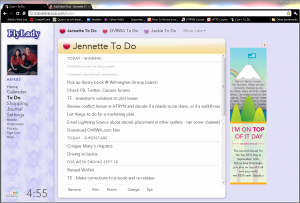As I dig deeper into revisions for Time’s Fugitive, it seems lately that I never get done what I’d planned. Seeing as the release is set for December (thankfully, I haven’t committed to when in December), this is a problem. I really need to be done with these revisions by the first of November at the latest, in order to give my beta readers and editor adequate time to do their thing. So it’s time to reevaluate the schedule again.
If nothing else, it should be clear that the routines (or schedules) we set up for ourselves need to be flexible, and we need to reevaluate periodically to make sure they’re still working for us (and not the other way around). So what was going on with mine?
I was spending no more than an hour each night dealing with email, checking friends’ blogs, and checking in on my social media presences. I was doing my workout, eating dinner with my family, and spending time with my pets. I was getting my paperwork and chore stuff done. Best of all, I was getting my writing. But not necessarily done. And by the time I got done with that and was ready to do a little business stuff – finding review blogs, designing business cards, stuff like that – it was time to get ready for bed.
Of course, it would be really easy to cut back on sleep. I’m a night person, and it’s almost always a challenge to get to bed on time because, hey, I was a zombie for half the day, but by evening, I’m good to go! That might not matter if I didn’t have a kid to take to school, and a job to go to. But I do, so I need to get up no later than 7 AM. Which is even harder than going to bed on time, even when I do. But going on less sleep has more ramifications than simply a lack of energy the following day. Sleep is our bodies restore themselves, both mentally and physically. Too little of it can make your ability to focus on a task take a real hit. That, too, might not be a problem if you do a mindless job, but I am a computer programmer. My day job deserves better, as does my writing! There are other health disadvantages in inadequate sleep, including more difficulty losing weight. I need all the help I can get there!
So cutting out sleep is not the answer. Better to figure out where the schedule went wrong – and what to do about it. Once I gave it a little thought, it was obvious where my failure was: my writing tasks for the day were taking more than the allotted hour – more like an hour and a half, or even two hours.
 The lesson here is that we need to figure out how long does a task really take, and choose a realistic time frame for completion. Maybe you were able to crank out a 50,000-word novel in one month for NaNoWriMo last year, but is working at that rate sustainable long-term? For many of us with day jobs, family and other responsibilities, NaNoWriMo involves putting other tasks to the side for that month, or cramming lots of writing into the weekend. I did NaNoWriMo in 2009 and won, and that’s how I did it. Instead of trying for the 1,667 words/day, every day, I instead shot for 1,000 words on four weekdays out of five, and 3,000 on Saturday and Sunday.
The lesson here is that we need to figure out how long does a task really take, and choose a realistic time frame for completion. Maybe you were able to crank out a 50,000-word novel in one month for NaNoWriMo last year, but is working at that rate sustainable long-term? For many of us with day jobs, family and other responsibilities, NaNoWriMo involves putting other tasks to the side for that month, or cramming lots of writing into the weekend. I did NaNoWriMo in 2009 and won, and that’s how I did it. Instead of trying for the 1,667 words/day, every day, I instead shot for 1,000 words on four weekdays out of five, and 3,000 on Saturday and Sunday.
And therein is my other tip for today: Allow yourself some time off. By divvying up our tasks in such a way that allow for an evening/day off, we reduce the pressure on ourselves, and in doing so, increase our chances for success. Miss a day? No worries! It’s built in. No need to stress about having to do x much more tomorrow.
And going back to the issue of tasks that take longer than we expect, the answer there is easy, too: we need to realistically estimate how much time a given task will really take, and allot for it.
The problem is, sometimes it’s hard to know how much time something will actually take, especially when it’s something that’s not always the same, like writing – or computer programming! Yes, I deal with this in my day job on a regular basis, and that’s where I learned the secret of scheduling: However much time you realistically think something will take, double it. And if there are a lot of variables or unknowns, double it again. I can’t tell you how many times these have saved face for me at work, where in programming, Murphy’s Law rules. With this kind of scheduling (and a great project manager who will fight for it with the client), I almost never fail to deliver what my clients expect, when they expect it. The times I have run up against this, have always been cases where the client refused to give us the amount of time we asked for. Conversely, clients are never upset when we deliver a project ahead of time, or are able to include wish-list features now that they were hoping to add later.
Do you find yourself not having enough hours in the day to do all you’d planned? If so, can you figure out why? Is it because things took longer than you thought, you didn’t allow yourself any extra time, or something else? Got any tips to share? If so, please do!



Pingback: Time Management Tip: Make a big task fit your life, rather than the other way around | Jennette Marie Powell